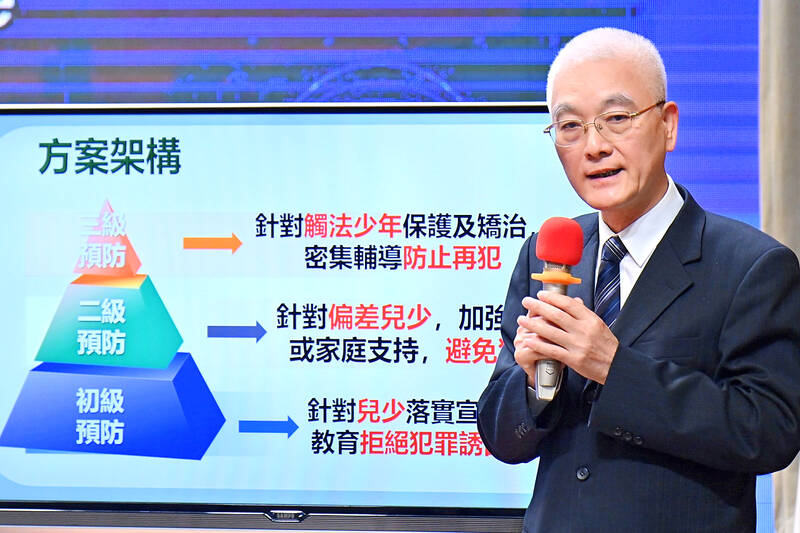The Ministry of the Interior is planning a three-tier strategy to combat a trend of growing adolescent crime, which would involve multiple agencies across different tiers, the ministry said during the weekly Executive Yuan meeting yesterday.
Premier Cho Jung-tai (卓榮泰) pledged to spend NT$7.6 billion (US$231.8 million) over four years until 2028 to prevent adolescent crime.
The ministry report said that adolescent crime over the past decade has grown, with most perpetrators aged between 15 and 18.

Photo courtesy of the Executive Yuan
Fraud is the primary type of crime among this group, the ministry said.
The proposed three-tier strategy aims to reduce how families, the economy and peers influence adolescents to commit criminal behavior.
“Adolescents aged 15 to 18 are more prone to joining criminal organizations if they do not continue their studies,” Executive Yuan spokesperson Michelle Lee (李慧芝) quoted Cho as saying during the meeting.
He also instructed relevant agencies to track the whereabouts and performance of young people in an attempt to prevent them — especially those from disadvantaged families — from being involved with criminal organizations, she said.
Government agencies should step up measures to work together to ensure the policy’s realization, Lee quoted the premier as saying.
Cho tapped Vice Premier Cheng Li-chun (鄭麗君) and ministers without portfolio Chen Shih-chung (陳時中) and Shih Che (史哲) to work with competent authorities, and draft laws and regulations that would provide a legal basis for organizations to care for and offer consultation to adolescents, she said.
According to National Police Agency Deputy Director-General Chen Yung-li (陳永利), the first tier would focus on spreading information targeting adolescents to avoid criminal behaviors.
The second tier would focus on adolescents with a history of errant behavior and step up consultations or visits to their families to encourage them to support the individual in question, Chen Yung-li said.
The final tier would focus on young people with a criminal history and help protect them, he said.
Such measures would also offer correctional education to prevent them from becoming repeat offenders, he added.
Ultimately, the goal is to reduce the number of young people breaking the law by 1 percent each year, Chen Yung-li said.
Additional reporting by Chung Li-hua

Taiwan is stepping up plans to create self-sufficient supply chains for combat drones and increase foreign orders from the US to counter China’s numerical superiority, a defense official said on Saturday. Commenting on condition of anonymity, the official said the nation’s armed forces are in agreement with US Admiral Samuel Paparo’s assessment that Taiwan’s military must be prepared to turn the nation’s waters into a “hellscape” for the Chinese People’s Liberation Army (PLA). Paparo, the commander of the US Indo-Pacific Command, reiterated the concept during a Congressional hearing in Washington on Wednesday. He first coined the term in a security conference last

Prosecutors today declined to say who was questioned regarding alleged forgery on petitions to recall Democratic Progressive Party (DPP) legislators, after Chinese-language media earlier reported that members of the Chinese Nationalist Party (KMT) Youth League were brought in for questioning. The Ministry of Justice Investigation Bureau confirmed that two people had been questioned, but did not disclose any further information about the ongoing investigation. KMT Youth League members Lee Hsiao-liang (李孝亮) and Liu Szu-yin (劉思吟) — who are leading the effort to recall DPP caucus chief executive Rosalia Wu (吳思瑤) and Legislator Wu Pei-yi (吳沛憶) — both posted on Facebook saying: “I

The Ministry of Economic Affairs has fined Taobao NT$1.2 million (US$36,912) for advertisements that exceed its approved business scope, requiring the Chinese e-commerce platform to make corrections in the first half of this year or its license may be revoked. Lawmakers have called for stricter enforcement of Chinese e-commerce platforms and measures to prevent China from laundering its goods through Taiwan in response to US President Donald Trump’s heavy tariffs on China. The Legislative Yuan’s Finance Committee met today to discuss policies to prevent China from dumping goods in Taiwan, inviting government agencies to report. Democratic Progressive Party Legislator Kuo Kuo-wen (郭國文) said

The Ministry of Economic Affairs has fined Taobao NT$1.2 million (US$36,900) for advertisements that exceeded its approved business scope and ordered the Chinese e-commerce platform to make corrections in the first half of this year or its license would be revoked. Lawmakers have called for stricter supervision of Chinese e-commerce platforms and more stringent measures to prevent China from laundering its goods through Taiwan as US President Donald Trump’s administration cracks down on origin laundering. The legislature’s Finance Committee yesterday met to discuss policies to prevent China from dumping goods in Taiwan, inviting government agencies to report on the matter. Democratic Progressive Party